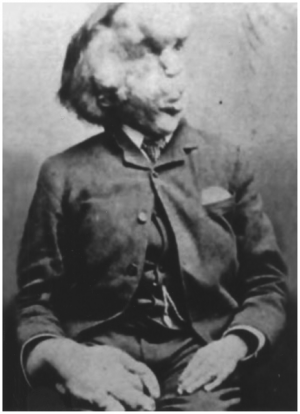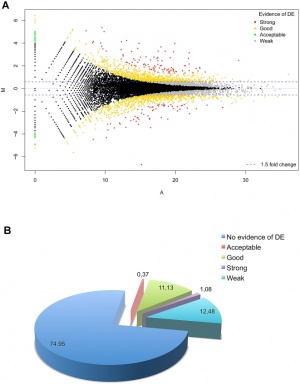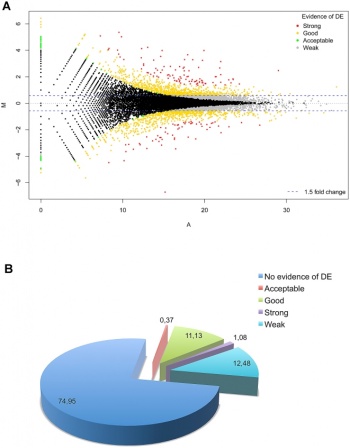User:Z3290689: Difference between revisions
No edit summary |
No edit summary |
||
| Line 12: | Line 12: | ||
=== Online Assignments === | === Online Assignments === | ||
==== Laboratory Session 1 ==== | ==== Laboratory Session 1 ==== | ||
===== Identify the origin of In Vitro Fertilization and the 2010 nobel prize winner associated with this technique. ===== | |||
The first successful use of [[In Vitro Fertilization]] | The first successful use of [[In Vitro Fertilization]] as an assisted reproductive technology occurred in 1978 under the direction of Robert D. Edwards, et al with the birth of Louise Brown. In 2010, Robert D. Edwards received the Nobel Prize in Physiology or Medicine "for the development of in vitro fertilization." | ||
===== Identify a recent paper on fertilisation and describe its key findings. ===== | |||
Eskander R.N., Randall L.M., Berman M.L., Tewari K.S., Disaia P.J., Bristow R.E. (2011). Fertility preserving options in patients with gynecologic malignancies. American Journal of Obstetrics & Gynecology, doi: 10.1016/j.ajog.2011.01.025 | Eskander R.N., Randall L.M., Berman M.L., Tewari K.S., Disaia P.J., Bristow R.E. (2011). Fertility preserving options in patients with gynecologic malignancies. American Journal of Obstetrics & Gynecology, doi: 10.1016/j.ajog.2011.01.025 | ||
| Line 24: | Line 24: | ||
===== Identify 2 congenital anomalies. ===== | |||
[[File:Journal.pone.0016409.g001.png|thumb|left|Sufferer of neurofibromatosis (Joseph Merrick)]] | [[File:Journal.pone.0016409.g001.png|thumb|left|Sufferer of neurofibromatosis (Joseph Merrick)]] | ||
| Line 30: | Line 30: | ||
Neurofibromatosis and Cystic Fibrosis: | Neurofibromatosis and Cystic Fibrosis: | ||
* Neurofibromatosis is a condition presenting with diffuse tumour growth in nervous tissue, often presenting superficially with raised welts. | * ''Neurofibromatosis'' is a condition presenting with diffuse tumour growth in nervous tissue, often presenting superficially with raised welts. | ||
* Cystic Fibrosis is a disease in which electrolyte balance, regulation and transport is compromised due to the absence of a certain protein. Signs and symptoms are numerous and varied. | * ''Cystic Fibrosis'' is a disease in which electrolyte balance, regulation and transport is compromised due to the absence of a certain protein. Signs and symptoms are numerous and varied. | ||
--[[User:Z3290689|z3290689]] 12:34, 4 August 2011 (EST) | --[[User:Z3290689|z3290689]] 12:34, 4 August 2011 (EST) | ||
| Line 38: | Line 38: | ||
==== Laboratory Session 2 ==== | ==== Laboratory Session 2 ==== | ||
===== Identify the ZP protein that spermatozoa binds and how is this changed (altered) after fertilisation. ===== | |||
ZP3 and ZP4 are the first proteins to bind to sperm, inducing the acrosome reaction. After induction of the acrosome reaction, ZP2 binds spermatozoa and is cleaved, causing conformational change of ZP3 that prevents polyspermy. | '''ZP3 and ZP4''' are the first proteins to bind to sperm, inducing the acrosome reaction. After induction of the acrosome reaction, '''ZP2''' binds spermatozoa and is cleaved, causing conformational change of ZP3 that prevents polyspermy. | ||
===== Identify a review and a research article related to your group topic. ===== | |||
Congenital Hypomyelinating Neuropathy: | ''Congenital Hypomyelinating Neuropathy'': | ||
Feltri M.A., et al (2000). P0 Glycoprotein Overexpression Causes Congenital Hypomyelination of Peripheral Nerves. The Journal of Cell Biology 148(5), 1021-1034 | Feltri M.A., et al (2000). P0 Glycoprotein Overexpression Causes Congenital Hypomyelination of Peripheral Nerves. The Journal of Cell Biology 148(5), 1021-1034 | ||
| Line 57: | Line 57: | ||
==== Laboratory Session 3 ==== | ==== Laboratory Session 3 ==== | ||
===== What is the maternal dietary requirement for late neural development? ===== | |||
Iodine. | Iodine. | ||
| Line 76: | Line 76: | ||
--[[User:Z3290689|z3290689]] 13:00, 18 August 2011 (EST) | --[[User:Z3290689|z3290689]] 13:00, 18 August 2011 (EST) | ||
===== The allantois, identified in the placental cord, is continuous with what anatomical structure? ===== | |||
The allantois is continuous with the superior end of the developing bladder. | The allantois is continuous with the superior end of the developing bladder. | ||
===== Identify the 3 vascular shunts, and their location, in the embryonic circulation. ===== | |||
In the heart lies the foramen ovale, joining the atria to prevent blood travelling to the lungs for oxygenation. | In the heart lies the '''foramen ovale''', joining the atria to prevent blood travelling to the lungs for oxygenation. | ||
Within the aortic arch lies the ductus arteriosus, connecting it to the pulmonary artery. | Within the aortic arch lies the '''ductus arteriosus''', connecting it to the pulmonary artery. | ||
Ductus venosus is found in the liver and connects the umbilical and portal veins to the IVC. | '''Ductus venosus''' is found in the liver and connects the umbilical and portal veins to the IVC. | ||
--[[User:Z3290689|z3290689]] 19:35, 24 August 2011 (EST) | --[[User:Z3290689|z3290689]] 19:35, 24 August 2011 (EST) | ||
===== Identify the Group project sub-section that you will be researching. ===== | |||
I'll do Aetiology of Fragile X Syndrome | I'll do Aetiology of Fragile X Syndrome | ||
| Line 102: | Line 102: | ||
--[[User:Z3290689|z3290689]] 11:26, 25 August 2011 (EST) | --[[User:Z3290689|z3290689]] 11:26, 25 August 2011 (EST) | ||
===== Which side (L/R) is most common for diaphragmatic hernia and why? ===== | |||
The majority of congenital diaphragmatic herniations are '''Bochdalek hernations''' and the majority of Bochdalek herniations occur on the posterior '''left''' side. They occur as a result of the pleuroperitoneal foramen's failure to close, allowing the viscera to enter the thorax. | |||
The majority of congenital diaphragmatic herniations are Bochdalek hernations | |||
--[[User:Z3290689|z3290689]] 13:26, 26 August 2011 (EST) | --[[User:Z3290689|z3290689]] 13:26, 26 August 2011 (EST) | ||
Revision as of 16:17, 29 August 2011
Lab 4 Online Assessment
- The allantois, identified in the placental cord, is continuous with what anatomical structure?
- Identify the 3 vascular shunts, and their location, in the embryonic circulation.
- Identify the Group project sub-section that you will be researching. (Add to project page and your individual assessment page)
Laboratory Sessions
Attendance
--Z3290689 12:58, 28 July 2011 (EST) --z3290689 11:33, 11 August 2011 (EST)
Online Assignments
Laboratory Session 1
Identify the origin of In Vitro Fertilization and the 2010 nobel prize winner associated with this technique.
The first successful use of In Vitro Fertilization as an assisted reproductive technology occurred in 1978 under the direction of Robert D. Edwards, et al with the birth of Louise Brown. In 2010, Robert D. Edwards received the Nobel Prize in Physiology or Medicine "for the development of in vitro fertilization."
Identify a recent paper on fertilisation and describe its key findings.
Eskander R.N., Randall L.M., Berman M.L., Tewari K.S., Disaia P.J., Bristow R.E. (2011). Fertility preserving options in patients with gynecologic malignancies. American Journal of Obstetrics & Gynecology, doi: 10.1016/j.ajog.2011.01.025 The key findings of this paper were that given the rising median age of primiparous women - when correlated with the median age of diagnosis of cervical, endometrial and ovarian cancer - exhibited a trend whereby a higher portion of nulliparous women would be diagnosed with conditions which could potentially severely reduce fertility. Consequently, there is increased pressure on obstetricians to offer non-standard treatments with higher risks to patients wishing to retain the option to bear children.
Identify 2 congenital anomalies.
Neurofibromatosis and Cystic Fibrosis:
- Neurofibromatosis is a condition presenting with diffuse tumour growth in nervous tissue, often presenting superficially with raised welts.
- Cystic Fibrosis is a disease in which electrolyte balance, regulation and transport is compromised due to the absence of a certain protein. Signs and symptoms are numerous and varied.
--z3290689 12:34, 4 August 2011 (EST)
Laboratory Session 2
Identify the ZP protein that spermatozoa binds and how is this changed (altered) after fertilisation.
ZP3 and ZP4 are the first proteins to bind to sperm, inducing the acrosome reaction. After induction of the acrosome reaction, ZP2 binds spermatozoa and is cleaved, causing conformational change of ZP3 that prevents polyspermy.
Congenital Hypomyelinating Neuropathy:
Feltri M.A., et al (2000). P0 Glycoprotein Overexpression Causes Congenital Hypomyelination of Peripheral Nerves. The Journal of Cell Biology 148(5), 1021-1034
This article addresses the role of the Myelin protein zero gene in regulating the levels of P0 protein, and the resulting degrees of either hypo- or hyper-myelination.
--z3290689 21:14, 7 August 2011 (EST)
Laboratory Session 3
What is the maternal dietary requirement for late neural development?
Iodine. --z3290689 17:10, 16 August 2011 (EST)
File:Differentially expressed RefSeq genes in human trisomy 21
Laboratory Session 4
--z3290689 13:00, 18 August 2011 (EST)
The allantois, identified in the placental cord, is continuous with what anatomical structure?
The allantois is continuous with the superior end of the developing bladder.
Identify the 3 vascular shunts, and their location, in the embryonic circulation.
In the heart lies the foramen ovale, joining the atria to prevent blood travelling to the lungs for oxygenation.
Within the aortic arch lies the ductus arteriosus, connecting it to the pulmonary artery.
Ductus venosus is found in the liver and connects the umbilical and portal veins to the IVC.
--z3290689 19:35, 24 August 2011 (EST)
Identify the Group project sub-section that you will be researching.
I'll do Aetiology of Fragile X Syndrome --Boris Zolotarev 10:38, 25 August 2011 (EST)
Laboratory Session 5
--z3290689 11:26, 25 August 2011 (EST)
Which side (L/R) is most common for diaphragmatic hernia and why?
The majority of congenital diaphragmatic herniations are Bochdalek hernations and the majority of Bochdalek herniations occur on the posterior left side. They occur as a result of the pleuroperitoneal foramen's failure to close, allowing the viscera to enter the thorax. --z3290689 13:26, 26 August 2011 (EST)


